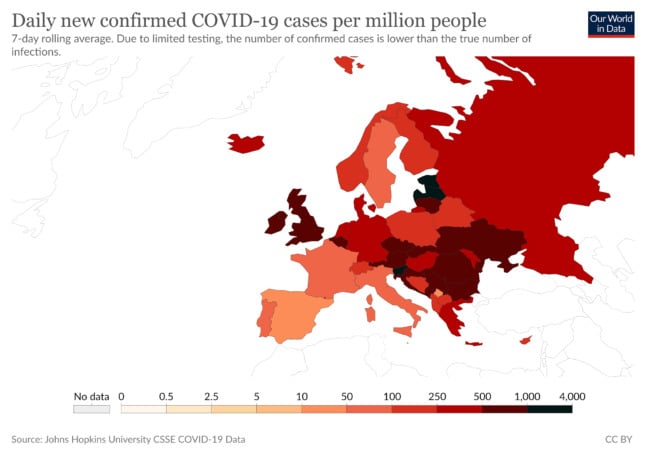Has Spain almost reached Covid-19 herd immunity?

Covid-19 infections are at their lowest levels since last autumn and almost 88 percent of the population over 12 has been vaccinated, so could Spain be on the verge of reaching herd immunity as health experts suggest?
Medical journal The Lancet has published an article suggesting that herd immunity in Spain may soon become a reality.
"Experts are beginning to believe the country is on the cusp of reaching something that barely seemed possible even weeks ago—herd immunity," reads the article.
Spain was one of the first countries in Europe to be hit hard by the Covid-19 pandemic, with 45,000 deaths during the first wave and a recent study by Northeastern and Boston universities published in Nature magazine suggesting only 1 in 100 infections were detected during those first months.
But as The Lancet points out, "since the first lockdown, however, the country has largely fared better than many of its European neighbours".
So why is that Spain has overtaken other countries in the race towards herd immunity?
What the Spanish government says
When asked on Thursday if Spain could achieve herd immunity, Health Minister Carolina Darias said: "With 90 percent of the population [who have been given at least the first vaccine dose], we are at a tremendously optimal level" to reach herd immunity.
In August, Spain revised its vaccination target from 70 to 90 percent following the emergence of Delta as a more transmissible variant, a vaccination goal which it is not far from reaching with almost 80 percent of the total population now fully vaccinated.
Spanish health authorities have determined the herd immunity threshold based on two factors: the effectiveness of vaccines and the R number (the average number of people that one person with Covid-19 will infect).
READ ALSO: ’70 percent vaccinated isn’t enough’ - Why Spain is revising its target for Covid herd immunity
Darias stressed that apart from "better vaccination levels", "Spain has low levels of infection risk compared to other countries".
This provides "ideal conditions to have the virus cornered", Spain's Health Minister concluded.
READ ALSO - Getting a Covid-19 booster shot in Spain: What you need to know
What the experts believe
“We still don't know the exact proportion of the population that needs to be immune to reach herd immunity for SARS-CoV-2, as we need to better understand the duration and protection of transmission generated from both vaccination and previous COVID-19 infection”, Jesús Rodríguez Baño, head of infectious diseases at the Virgen de la Macarena Hospital in Seville, told The Lancet.
“However, the situation in Spain might provide some clues: after leaving behind most of the control measures in the population, the infection rate (and particularly the hospital admission rate) has been going down, and this is the opposite of what happened with previous waves.
"The only plausible explanation is the very high rate of vaccination in the country,” Baño concluded.
The current epidemiological situation in Spain
Although so far this autumn Covid infections have stayed low, cases have been rising slightly during the last two weeks.
On Thursday November 4th, the country's health ministry reported that the fortnightly infection rate was above 50 cases per 100,000 for the first time in weeks, putting it back in the medium risk category.
However, hospitalisations remain low (1,799 people across the country, 400 of whom are in ICU) and Covid-19 deaths in the past week in Spain number 52.

Covid-19 cases across Europe during the last seven days. Source: Our World in Data
Covid-19 cases are still down two-thirds from levels seen in September 2020. Experts are now waiting to see whether the arrival of the cold autumn weather will have an impact on infections and hospitalisations.
READ ALSO: Why are Spanish homes so cold?
Baño believes that winter 2021–22 in Spain will be very different from what we experienced in 2020. “However, we must be prudent in our predictions. The third booster dose is already being administered in high-risk groups here in Spain, and we must still see whether a third dose (or a yearly dose) is needed for everyone. Also, new variants might cause problems.”
How Spain compares with other European countries
Although the vaccination programme in Spain started slowly, the percentage of the population over 12 who are now fully vaccinated is over 80 percent, which is much higher than countries such the UK, France, Germany and Italy.
In terms of hospitalisations Spain has seen one of the biggest percentage decreases in Europe, down 62 percent, just behind Malta which saw an 83.8 percentage decrease. Incidentally, Malta is one of only two European countries which has a larger percentage of the population fully vaccinated than Spain.
Cases have also been rising more rapidly across other European countries. The UK for example currently has an infection rate much higher than Spain’s at 407 cases per 100,000 in the last seven days. Recently the UK has seen daily case rates of 50,000.
But is the difference in case numbers because of Spain almost reaching herd immunity and its vaccination rates being higher or is it the fact that the UK opened up all businesses and removed all legally binding COVID restrictions in July, 2021, including the need to wear masks indoors?
Spain meanwhile kept up many of its restrictions such as mask-wearing indoors, capacity limits in bars and restaurants, and nightlife venues only reopened in many regions last month.
READ ALSO: What Covid-19 restrictions are in place in Spain’s regions in November?
Denmark similarly lifted all Covid-19 restrictions in September 2021 and since then, cases have risen from around 300 per day in late September to more than 700 per day in late October.
Comments
See Also
Medical journal The Lancet has published an article suggesting that herd immunity in Spain may soon become a reality.
"Experts are beginning to believe the country is on the cusp of reaching something that barely seemed possible even weeks ago—herd immunity," reads the article.
Spain was one of the first countries in Europe to be hit hard by the Covid-19 pandemic, with 45,000 deaths during the first wave and a recent study by Northeastern and Boston universities published in Nature magazine suggesting only 1 in 100 infections were detected during those first months.
But as The Lancet points out, "since the first lockdown, however, the country has largely fared better than many of its European neighbours".
So why is that Spain has overtaken other countries in the race towards herd immunity?
What the Spanish government says
When asked on Thursday if Spain could achieve herd immunity, Health Minister Carolina Darias said: "With 90 percent of the population [who have been given at least the first vaccine dose], we are at a tremendously optimal level" to reach herd immunity.
In August, Spain revised its vaccination target from 70 to 90 percent following the emergence of Delta as a more transmissible variant, a vaccination goal which it is not far from reaching with almost 80 percent of the total population now fully vaccinated.
Spanish health authorities have determined the herd immunity threshold based on two factors: the effectiveness of vaccines and the R number (the average number of people that one person with Covid-19 will infect).
READ ALSO: ’70 percent vaccinated isn’t enough’ - Why Spain is revising its target for Covid herd immunity
Darias stressed that apart from "better vaccination levels", "Spain has low levels of infection risk compared to other countries".
This provides "ideal conditions to have the virus cornered", Spain's Health Minister concluded.
READ ALSO - Getting a Covid-19 booster shot in Spain: What you need to know
What the experts believe
“We still don't know the exact proportion of the population that needs to be immune to reach herd immunity for SARS-CoV-2, as we need to better understand the duration and protection of transmission generated from both vaccination and previous COVID-19 infection”, Jesús Rodríguez Baño, head of infectious diseases at the Virgen de la Macarena Hospital in Seville, told The Lancet.
“However, the situation in Spain might provide some clues: after leaving behind most of the control measures in the population, the infection rate (and particularly the hospital admission rate) has been going down, and this is the opposite of what happened with previous waves.
"The only plausible explanation is the very high rate of vaccination in the country,” Baño concluded.
The current epidemiological situation in Spain
Although so far this autumn Covid infections have stayed low, cases have been rising slightly during the last two weeks.
On Thursday November 4th, the country's health ministry reported that the fortnightly infection rate was above 50 cases per 100,000 for the first time in weeks, putting it back in the medium risk category.
However, hospitalisations remain low (1,799 people across the country, 400 of whom are in ICU) and Covid-19 deaths in the past week in Spain number 52.

Covid-19 cases are still down two-thirds from levels seen in September 2020. Experts are now waiting to see whether the arrival of the cold autumn weather will have an impact on infections and hospitalisations.
READ ALSO: Why are Spanish homes so cold?
Baño believes that winter 2021–22 in Spain will be very different from what we experienced in 2020. “However, we must be prudent in our predictions. The third booster dose is already being administered in high-risk groups here in Spain, and we must still see whether a third dose (or a yearly dose) is needed for everyone. Also, new variants might cause problems.”
How Spain compares with other European countries
Although the vaccination programme in Spain started slowly, the percentage of the population over 12 who are now fully vaccinated is over 80 percent, which is much higher than countries such the UK, France, Germany and Italy.
In terms of hospitalisations Spain has seen one of the biggest percentage decreases in Europe, down 62 percent, just behind Malta which saw an 83.8 percentage decrease. Incidentally, Malta is one of only two European countries which has a larger percentage of the population fully vaccinated than Spain.
Cases have also been rising more rapidly across other European countries. The UK for example currently has an infection rate much higher than Spain’s at 407 cases per 100,000 in the last seven days. Recently the UK has seen daily case rates of 50,000.
But is the difference in case numbers because of Spain almost reaching herd immunity and its vaccination rates being higher or is it the fact that the UK opened up all businesses and removed all legally binding COVID restrictions in July, 2021, including the need to wear masks indoors?
Spain meanwhile kept up many of its restrictions such as mask-wearing indoors, capacity limits in bars and restaurants, and nightlife venues only reopened in many regions last month.
READ ALSO: What Covid-19 restrictions are in place in Spain’s regions in November?
Denmark similarly lifted all Covid-19 restrictions in September 2021 and since then, cases have risen from around 300 per day in late September to more than 700 per day in late October.
Join the conversation in our comments section below. Share your own views and experience and if you have a question or suggestion for our journalists then email us at [email protected].
Please keep comments civil, constructive and on topic – and make sure to read our terms of use before getting involved.
Please log in here to leave a comment.